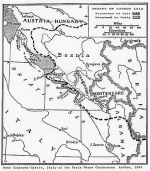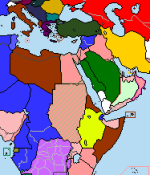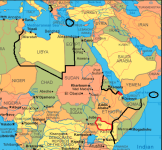raharris1973
Well-known member
Could a better handled Italy have become France's partner in enforcing the Versailles treaty?
I've wondered about this.
I've always been quick to agree that by not, at a minimum, granting Italy all its territorial claims per the Treaty of London, the western Allies, France, the UK, and USA leading the pack, made a realpolitik blunder and alienated Italy.
Italy as a gainer from the Habsburg collapse, should have been a champion of the post-Versailles, post-Saint-Germain system, according to this thinking.
In realpolitik terms, ethnoloinguistics aside, wherever there was a clash between Italian and Yugoslav claims, it made more sense to resolve them in Italy's favor because Italy was stronger, and Serbia had plenty to be grateful for in terms of being rescued from occupation and the other South Slavs in independence from Austria-Hungary. Wilson seemed most determined to disregard the London Treaty as definitive grounds for resolving claims, but I've also read that that the French, less committed to idealism, saw Yugoslavia as sort of a counterweight or container to Italy. If so, that sounds like silly overreach for France - just how many powers did France think it could balance against?
However, recently, I've started to doubt whether an Italy granted its claims in the Adriatic and thus not driven to walk out on Versailles could really end up as a reliable police enforcer of Versailles and partner of France anyway. For one, internal social disorder was going to put Italian democracy in grave danger, and even without mutilated victory propaganda, fear or Red takeover could have been enough for the Italian establishment and royalty to surrender their country to Fascist dictatorship. Secondly, system of government aside even if the Italian people weren't fans of wars, or not fans of big wars against peers [and frankly, even Mussolini wasn't even a fan of wars against peer powers involving hard fighting, he thought the war he entered in Jun1940 was all but over], many, many Italians - Fascist and non-Fascist - had an opportunistic, revisionist foreign policy agenda, unsatisfied with the current division of the world favoring the British and French.
Italy demanded, and got, border adjustments in Libya in its favor during the interwar years from Britain and France. It had claims and ambitions to advance on French and British possessions as well, and Ethiopia, and claims to rightful influence over Spain and the Balkans.
Italy limiting its foreign policy demands, under any regime, to being an uncomplaining ally to London and Paris (and Washington), interested in no more than keeping Austria out of Germany's clutches, seems a bit unlikely, despite the hopes raised even in OTL by the Stresa Front. Even if we suppose territorial satisfaction of European claims at the end of Great War.
Your thoughts?
I've wondered about this.
I've always been quick to agree that by not, at a minimum, granting Italy all its territorial claims per the Treaty of London, the western Allies, France, the UK, and USA leading the pack, made a realpolitik blunder and alienated Italy.
Italy as a gainer from the Habsburg collapse, should have been a champion of the post-Versailles, post-Saint-Germain system, according to this thinking.
In realpolitik terms, ethnoloinguistics aside, wherever there was a clash between Italian and Yugoslav claims, it made more sense to resolve them in Italy's favor because Italy was stronger, and Serbia had plenty to be grateful for in terms of being rescued from occupation and the other South Slavs in independence from Austria-Hungary. Wilson seemed most determined to disregard the London Treaty as definitive grounds for resolving claims, but I've also read that that the French, less committed to idealism, saw Yugoslavia as sort of a counterweight or container to Italy. If so, that sounds like silly overreach for France - just how many powers did France think it could balance against?
However, recently, I've started to doubt whether an Italy granted its claims in the Adriatic and thus not driven to walk out on Versailles could really end up as a reliable police enforcer of Versailles and partner of France anyway. For one, internal social disorder was going to put Italian democracy in grave danger, and even without mutilated victory propaganda, fear or Red takeover could have been enough for the Italian establishment and royalty to surrender their country to Fascist dictatorship. Secondly, system of government aside even if the Italian people weren't fans of wars, or not fans of big wars against peers [and frankly, even Mussolini wasn't even a fan of wars against peer powers involving hard fighting, he thought the war he entered in Jun1940 was all but over], many, many Italians - Fascist and non-Fascist - had an opportunistic, revisionist foreign policy agenda, unsatisfied with the current division of the world favoring the British and French.
Italy demanded, and got, border adjustments in Libya in its favor during the interwar years from Britain and France. It had claims and ambitions to advance on French and British possessions as well, and Ethiopia, and claims to rightful influence over Spain and the Balkans.
Italy limiting its foreign policy demands, under any regime, to being an uncomplaining ally to London and Paris (and Washington), interested in no more than keeping Austria out of Germany's clutches, seems a bit unlikely, despite the hopes raised even in OTL by the Stresa Front. Even if we suppose territorial satisfaction of European claims at the end of Great War.
Your thoughts?




